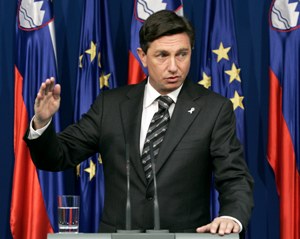NEWS
Prime Minister’s press conference
At today's press conference, the Prime Minister of the Republic of Slovenia, Borut Pahor, outlined the major resolutions and decisions adopted by the Government in its 56th regular session, and answered a number of questions on current issues.
(Photo: Daniel Novakovič/STA)
Prime Minister Pahor opened the press conference by touching upon trade-union organised demonstrations to take place on Saturday, 28 November 2009. According to Mr Pahor, this method of labour protest is quite legitimate and the Government understands the intention of the trade unions to communicate their differing positions in this manner. The Government nevertheless suggests that these positions be discussed within social dialogue and that the discussion on issues of mutual interest be continued. Prime Minister Pahor said that at this moment, the demand for a minimum wage of EUR 600 is not entirely reasonable, as its introduction overnight could jeopardise the competitiveness of the Slovenian corporate sector. Raising the minimum wage should be a progressive process, while the timing and the amount of the raise should be determined within the framework of negotiations between employers and employees. Mr Pahor emphasised that the Government is willing to assume the role of mediator between the negotiating parties.
He went on to recall that both pension and health reform are already the subject of a public debate, with the key issue of the reform of the pension system being its long-term sustainability.
At today’s session, the ministerial corps discussed the Position Paper on the participation of the Slovenian delegation in the meeting of the EU Council on Justice and Home Affairs, where the participants will also address the issue of visa liberalisation. Among other things, the Council will adopt a regulation abolishing the visa regime for Macedonia and Serbia and Montenegro from 19 December 2009. As one of the initiators launching and rapidly concluding this process, Slovenia’s role in this matter was highly significant.
The Government also laid down the wording of the Act amending the Election of Slovenian Members to the European Parliament Act. The amendment provides a legal basis for the appointment of the eighth MP, which Slovenia will be entitled to once the Lisbon Treaty has been implemented. Following the principle of rationality, economy and expediency, the Government suggests that the eighth member be the candidate from the candidate list who would have been elected eighth member in accordance with the outcome of the elections to the European Parliament on 7 June 2009.
The Government today adopted a new action plan for introducing a free-flow electronic tolling system. In designing and introducing a new tolling system, it must be taken into account that in 2012, all vehicles will have to be included in the free-flow electronic tolling system on motorways and expressways, while for cars, the regulation allows for a possibility of the immediate introduction of tolling based on the distance travelled, or a possibility to continue with paying a flat-rate toll based on time-related use through the introduction of an electronic vignette by 2014.
At today’s session, the Government also adopted the 2010–2015 Strategy of Prevention and Control of HIV/AIDS Infections. Bearing in mind that less than one in 1,000 of the population is affected by HIV infection, a relatively small percentage in comparison with the majority of other EU Member States, Slovenia can be considered quite successful in controlling this disease. The adopted strategy outlines the continuation and upgrading of previous activities to prevent and control HIV/AIDS infections. It is based on the following three pillars: preventing HIV infections, providing early detection of infections, preventing their transmission and providing adequate treatment, and reducing the individual and social impact of HIV infections. Prevention of infections and preventive action are the strategy’s key threads.




